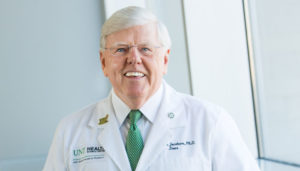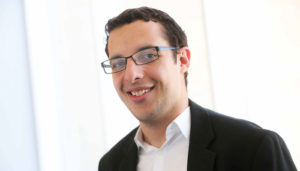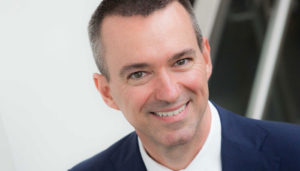Fort Worth’s first class of pharmacists
By Jan Jarvis

For Nola Curry, the dream of becoming a pharmacist had to wait.
She instead trained to become a licensed vocational nurse while still in high school and worked in long-term care facilities after graduation. A few years later, she put her career plans on hold to marry and start a family.
| 2017 Commencement Ceremony When: 9 a.m. Saturday, May 20 Where: Schollmaier Arena, Texas Christian University Social media: #UNTHSCgrad Other highlights:
|
By the time she had her third child, going to pharmacy school was all but forgotten. Years passed. Then one day, the very words she used to encourage her children echoed in her head.
“I would tell my kids that they could do anything they wanted to do, but I wasn’t doing that myself,” she said. “I felt like I had to give it a try.”
It meant taking classes at community college while working full time, selling her house, moving her family from Wylie and making countless financial sacrifices.
Curry’s journey to becoming a pharmacist might be unique, but her dedication to caring for others is common among the 68 students who make up the first graduating class of the UNT System College of Pharmacy.
“All along the way I felt like quitting, but I just kept going,” she said. “It just feels awesome to finally be here.”
It was a love of chemistry that inspired some. For others, it was a desire to carry on a family tradition. For Curry, it was a goal worth holding out for.
“Ever since I was young, I knew that helping people was what I wanted to do,” she said.
The beginning
The need for a pharmacy program in North Texas had long been clear.
Despite the explosive population growth of Dallas-Fort Worth, there was no four-year pharmacy program. Houston, Lubbock, Tyler, Austin and San Antonio all had graduate programs for pharmacy, but none served the North Texas community, which has about 7 million residents, more than 22,000 hospital beds and nearly 600 community pharmacies.
In 2011, the idea became reality, thanks to strong support from leaders such as state Senator Jane Nelson, Chancellor Lee Jackson and Brint Ryan, now the Chairman of the UNT System Board of Regents.

“We talked about how pharmacy adds to the health care team and that medication management was a critical part of monitoring chronic disease,” said Thomas Yorio, PhD, Provost Emeritus and Professor in the North Texas Eye Research Institute. “UNTHSC was in a unique position to have a pharmacy on the same campus as the other health professions to help promote the health care team of the future.”
Myron Jacobson, PhD, was appointed as founding dean. Dr. Jacobson served as Chairman of the Cell Biology and Anatomy at UNTHSC from 1989 to 1992 before leaving for posts at the pharmacy colleges at the University of Kentucky and the University of Arizona.
After two decades of experience elsewhere, Dr. Jacobson could clearly see the need for a pharmacy school in Fort Worth. He welcomed the opportunity to lead it.
“The DFW metropolitan area is the fourth largest in the United States, and I was astounded to learn that it did not have a college of pharmacy,” he said. “It was clear that UNTHSC was the best location for doctor of pharmacy education because of the presence of other health-related schools and the strong commitment to primary health care.”
Dr. Jacobson focused on ensuring that the school’s graduates would be prepared for the vast opportunities available to pharmacists. He envisioned a program that would emphasize the growing role that pharmacists would play in patient care.
“One of the major issues in health care is the fragmentation in the system with the resulting lack of teamwork in health care,” he said. “Pharmacists are the most accessible health care providers and have great potential to impact the health of their patients.”
Pharmacy pioneers
Being a student in the first pharmacy school class came with risks, but also with opportunities to create something new.
“Our students really helped shape the program,” Dr. Yorio said. “We needed input from the first class of students who really paved the way for future classes.”
More than 350 would-be students applied for the initial class. Being able to go to the first pharmacy school in Fort Worth was an opportunity that Mark Gehrig did not want to miss.
“UNTHSC is about 90 minutes from my hometown, and I have a lot of family in DFW,” he said. “I knew I would get a solid education there with plenty of sites in DFW for my fourth-year rotation.”
Being in the inaugural class – “a first-born,” as Dr. Jacobson calls them – came with both rewards and challenges. It included numerous opportunities that only the first class could experience.

“I think I was most excited about the many leadership opportunities and the chance to help grow and develop the pharmacy curriculum for future students,” Mehdi Namil said.
Many students were pioneers in the truest sense. The practice of pharmacy has dramatically changed in recent years, exploding with diverse opportunities that were unheard a few decades ago.
No longer seen as just “pill counters,” pharmacists today have plenty of places to work beyond community pharmacies. And they are taking on expanding roles in medication management and other forms of care-giving.
While working as a pharmacy technician, Namil discovered that retail work can have an impact on the community as well as individual patients.
“Anytime I saved a patient money, provided great customer service or made a meaningful connection with someone, I got this very satisfying feeling,” Namil said. “And that feeling intensified my passion for pharmacy.”
The future
Not only is the College of Pharmacy eligible for full accreditation in June, but it will have a new home in 2018. The school will be housed inside the limestone walls and glass panels of the new Interdisciplinary Research and Education Building. The five-story building, funded in part by $80 million from the Texas Legislature, is very much a vision for the future.

With its research and instructional labs, classrooms, study space and cafe, it’s the kind of place that promotes active, team-based learning – exactly what was envisioned by the College of Pharmacy’s pioneers.
Dr. Charles Taylor, the newly named Dean of Pharmacy who begins in June, says he will continue the school’s commitment to making health care better.
“Everything that we did – and will do – has been by design,” he said. “Guided by a tremendous leader, this faculty built a forward-thinking, innovative program and recruited the best and brightest students. These graduates are ready to help people, families, and our community live healthier, better, lives.”






Social media